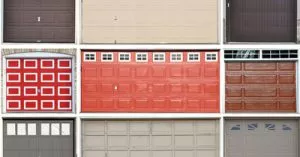
The Best Garage Door Materials
There isn’t one specific type of garage door material that’s better than all others. The best material for your garage door matches the needs of you and your family’s home.
Select a garage door according to the surrounding climate and the purpose you wish to fulfill with a new installation.
Wooden Garage Doors
One of the main benefits of wooden garage doors, despite their cost, revolves around the fact that wood is a terrific natural visual effect. Wood also provides a great level of strength, durability and resistance to the environment, especially when the door is properly finished and treated well. In fact, perfectly maintained, a well‑made wooden garage door can outlast nearly all other parts of your home.
Typically, anything made of wood is considered to be more aesthetically pleasing than a similar item manufactured with another material. Garage doors made of wood are no exception. However, the visual appeal and the benefits of having a wood door vary according to the material chosen. Hemlock, pine and oak are types of wood with lighter colors and less density, making them ideal for lightweight garage doors.
Mahogany, on the other hand, is a dark, dense wood, more often chosen for the dramatic flair that this type of material adds to the home. Because of its heft, mahogany is often layered with lighter materials to make the weight manageable.
In terms of customization, wooden garage doors are a notch above other types of materials, allowing home owners to commission gorgeous designs superior to steel, aluminum or fiberglass constructions.
Steel Garage Doors
Steel garage doors are an option for homeowners who want a strong, inexpensive solution that also provides the ability to achieve a customized look. Depending on the quality of the steel and how well you treat your garage, steel garage doors may be just a strong as a wood garage door. Check the thickness of the steel to reveal the quality of the build.
The worst quality steel tends to be made of 28‑gauge material while the best quality construction will be close to 26‑gauge. The thinner the steel, the more likely that dents will impact the door. Thin steel will also be more susceptible to rust.
Steel will never replace wood in terms of natural beauty, but manufacturers have been stepping up to create designs and finishes that give homeowners the option of creating a custom look that can effectively mimic wood. Top‑quality garage doors will also have a finish that features polyester "baked‑on" to the steel, reducing the effects of rust while improving dent resistance.
An insulated steel door provides a better level of insulation that wood offers. However, some non‑insulated steel doors may be constructed in such a way to build additional insulation into the door. Using the appropriate primer and paint, steel doors may be painted in a similar way to wood doors.
Aluminum Garage Doors
Aluminum garage doors, with insulation core, are one of the most expensive material with which to build a garage door. As a result, the main benefit of aluminum is the fact that it’s a lightweight material, which reduces the amount of stress that the door places on the garage door opener.
Compared to most of the alternatives, 1 ¾‑thick aluminum garage doors offer a good insulation. Aluminum does not rust and performs well in corrosive environments, like coastal communities. If you live in a coastal area, the non‑corrosive nature of an aluminum garage door can lead to longer door life.
They are also a little bit easy to scratch and dent and can’t easily be repaired if damage takes place. An appropriate finishing treatment increases resistance to rust, which is another weakness of aluminum garage door installation.
Fiberglass Garage Doors
One of the newer types of garage door materials is fiberglass, which represents a limited number of doors on the market. Overall, fiberglass is perhaps one of the lightest materials for a garage door, but it’s one of the worst insulators among garage door materials. Fiberglass is also susceptible to ultraviolet radiation, which means that the material will fade over time.
Compared to thin metal doors, fiberglass has a greater resistance against dents. Also, due to the lack of metal in the material, fiberglass doors do not oxidize in saltwater, making these doors naturally rust proof.
The Right Door for the Right Environment
When choosing a material for your garage door, the most important aspect to consider is the needs of you and your home. People who live in colder climates will require a vastly different garage door than those who live in warmer areas. Regardless of your needs and your budget, contact Car‑Wal Doors to find out more about the garage door options that will work best for your home.
You can click here to get a free quote, or click here to start by building your perfect garage door!

Add new comment